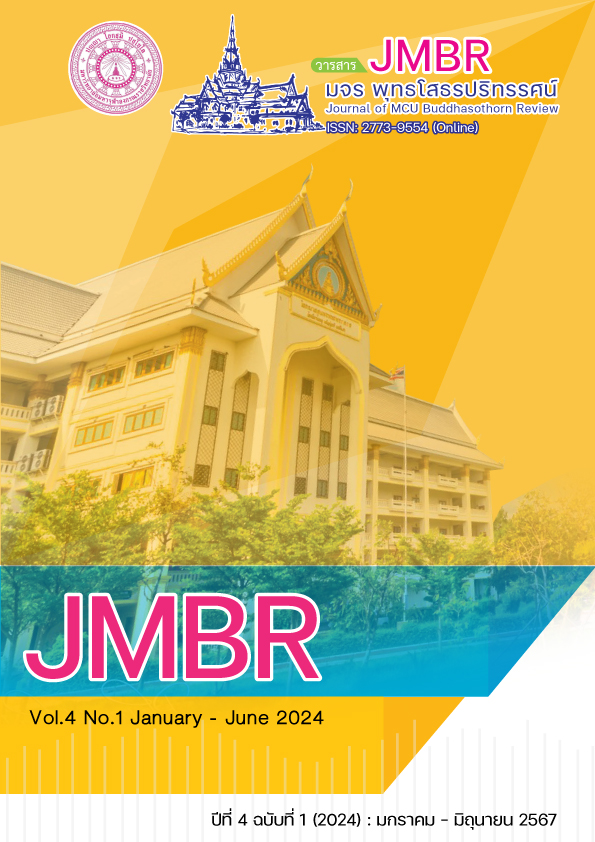Conscious: Tackling Corruption in Thai Society Tackling Corruption in Thai Society
Main Article Content
Abstract
In the present, the corruption in Thailand is considered a chronic problem and become the more severe and complex problems and has wide-ranging impacts. Especially, the national security is one of the top problems that hinders the country's development in terms of economics, society and politics, because it happened in every sector in Thai society, and even it is the political sector, the government sector, especially local government organizations. They are often viewed outside of the society as organizations that facilitate on the corruption. To solve the corruption problem, the right methods must be used to help and enlarged to the people by creating citizenship consciousness or collaboratively participation to solve the problem with the masses of the people on all parts. There are many different theories, such as the theory of creating citizenship consciousness. With the principle of checking state power, it is a check on state power by organizations in several parts of the government, private, and civil society sectors. With the rule of law, a state is governed by controlled laws or under just laws, etc.
In this academic article, the author has presented guidelines for solving corruption problems in the two levels: the individual level by building people's immunity in political participation and creating awareness to integrate the Buddhist principles and promote the various concepts mentioned as above appeared. Mechanism for goodness resisting of the corruption would be built in Thai culture with the well-management system and the nation progressively development in every part of Thailand’s organizations.
Article Details

This work is licensed under a Creative Commons Attribution-NonCommercial-NoDerivatives 4.0 International License.
ต้นฉบับที่ได้รับการตีพิมพ์ในวารสาร มจร พุทธโสธรปริทรรศน์ วิทยาลัยสงฆ์พุทธโสธร มหาวิทยาลัยมหาจุฬาลงกรณราชวิทยาลัย ถือเป็นกรรมสิทธิ์ของวิทยาลัยสงฆ์พุทธโสธร มหาวิทยาลัยมหาจุฬาลงกรณราชวิทยาลัย ห้ามนำข้อความทั้งหมดหรือบางส่วนไปพิมพ์ซ้ำ เว้นเสีย แต่ว่าจะได้รับอนุญาตจากวิทยาลัยฯ เป็นลายลักษณ์อักษร และเพื่อให้เป็นไปตามกฎหมายลิขสิทธิ์ ผู้เขียนทุกท่านต้องลงลายมือชื่อในแบบฟอร์มใบมอบลิขสิทธิ์ บทความให้แก่วารสาร พร้อมกับบทความต้นฉบับที่ได้แก้ไขครั้งสุดท้าย นอกจากนี้ ผู้เขียนทุกท่านต้องยืนยันว่าบทความต้นฉบับที่ส่งมาตีพิมพ์นั้น ได้ส่งมาตีพิมพ์เฉพาะในวารสาร มจร พุทธโสธรปริทรรศน์ เพียงแห่งเดียวเท่านั้น
References
เกริกไกร จิระแพทย์. (2520). คอร์รัปชันในรัฐบาลท้องถิ่นรัฐนิวเช้าธ์เวลส์. แปลและเรียบเรียงโดย วาสิษฐ์ บุนนาค. วารสารสำนักงาน, ป.ป.ป.
เกรียงศักดิ์ เจริญวงศ์ศักดิ์. (2547). กลเม็ดเด็ดปีกคอร์รัปชัน. กรุงเทพฯ: บริษัทซัดเซสมีเดีย จำกัด.
เกียรติภูมิ วงศ์รจิต. (9 ธันวาคม2562). แนะ 5 วิธี สอนเด็กโตไปไม่โกง. สืบค้นเมื่อ 14 พฤษภาคม 2567, จาก https://www.thaipbs.or.th/news/content/286854
จรัส สุวรรณเวลา. (2546). จุดบอดบนทางสู่ธรรมาภิบาล : บทบาทของบอร์ดองค์การมหาชน. กรุงเทพฯ : จุฬาลงกรณ์มหาวิทยาลัย.
ณัจฉลดา พิชิตบัญชาการ. (2526). ปัญหาสังคม. กรุงเทพฯ: กิ่งจันทร์การพิมพ์.
ธานินทร์ กรัยวิเชียร. (2518). ครูกับทางอยู่รอดของสังคมไทย. กรุงเทพฯ: สำนักนายกรัฐมนตรี.
ประเวศ วะสี. (2546). ธรรมาภิบาลกับคอร์รัปชันในสังคมไทย. กรุงเทพฯ: มปท.
ปรีชา อุยตระกูล (2561). ประชาสังคมกับการเสริมสร้างธรรมาภิบาลท้องถิ่นเพื่อพัฒนาระบบและกลไกในการป้องกันการทุจริตคอร์รัปชัน: กรณีศึกษาจังหวัดนครราชสีมา (รายงานวิจัย). สำนักงานคณะกรรมการส่งเสริมวิทยาศาสตร์ วิจัยและนวัตกรรม.
พระปลัดเทียน พลวุฒฺโฒ. (2552). ธรรมาภิบาล : การแก้ปัญหาคอร์รัปชันในสังคมไทย. วารสารดิฉัน, 1(766), 1-12.
ยิ่งศักดิ์ จิตตะโคตร์. (14 มิถุนายน 2555). จิตสำนึกคือสภาพจิตที่มีสติสัมปชัญญะ. สืบค้นเมื่อ 14 พฤษภาคม 2567, จาก https://www.gotoknow.org/posts/335967
กุหลาบ รัตนสัจธรรม. (2546) การศึกษา วิเคราะห์ สังเคราะห์ ภาพรวมจรรยาบรรณวิชาชีพในประเทศไทย. กรุงเทพฯ: สำนักมาตรฐานและประเมินผลอุดมศึกษา –
สภาวิจัยแห่งชาติ. (2509). การทุจริตในวงราชการ (รายงานวิจัย). กรุงเทพฯ: สภาวิจัยแห่งชาติ.
สัมฤทธิ์ ยศสมศักดิ์. (2549). การบริหารทรัพยากรมนุษย์. พิมพ์ครั้งที่ 2. กรุงเทพฯ : เอท. ที. เพรส.
สุธี อากาศฤกษ์. (2524). มูลเหตุแห่งคอร์รัปชัน. กรุงเทพฯ: สำนักงานคณะกรรมการป้องกันและปราบปรามการทุจริตแห่งชาติ.
อุดม มุ่งเกษม. (2545). Good Governance กับการพัฒนาข้าราชการ. กรุงเทพฯ: สถาบันพัฒนาข้าราชการพลเรือน.
อุทัย หิรัญโต. (2512). ข้าราชการ: ทำไมคอร์รัปชัน. กรุงเทพฯ: สำนักพิมพ์อินเดียนสโตร.
_______. (2517). ปัญหาข้าราชการคอร์รัปชันในประเทศไทย. กรุงเทพฯ: พัฒนบริหารศาสตร์.
ACT. (17 มีนาคม 2560). วงจรของคอร์รัปชัน. สืบค้นเมื่อ 14 พฤษภาคม 2567, จาก http://www.anticorruption.in.th/2016/th/detail/135/5/วงจรคอร์รัปชัน
Bowles, T. (1999). Focusing on time orientation to explain adolescent self concept and academic achievement: Part 2: Testing a model. Journal of Applied Health Behaviour, 1(2), 1–8.
University of Florida. (1963). Webster's Seventh New collegiate Dictionary. D 2 C, Merrian Co.


